The Espionage Act of 1918, 'MAGA' Act and Supreme Court
VerifiedAdded on 2023/06/03
|5
|1395
|324
Essay
AI Summary
This essay delves into the Espionage Act of 1918, exploring its origins during World War I, its amendments, and its constitutionality as upheld by the Supreme Court, particularly in the Schenck v. United States case. The essay outlines the act's provisions, including penalties for offenses like communicating false information and providing information to enemies. It then hypothetically analyzes the constitutionality of a 'Make America Great Again' Act, considering potential crimes and penalties. The essay discusses the Supreme Court's likely approach to such legislation, emphasizing the consideration of citizen rights and freedoms, referencing the Schenck and Eugene V. Debs cases. Finally, the essay predicts the Supreme Court's likely stance on the 'Make America Great Again' Act, emphasizing the protection of the American government and armed forces. The essay uses multiple sources to support its arguments.
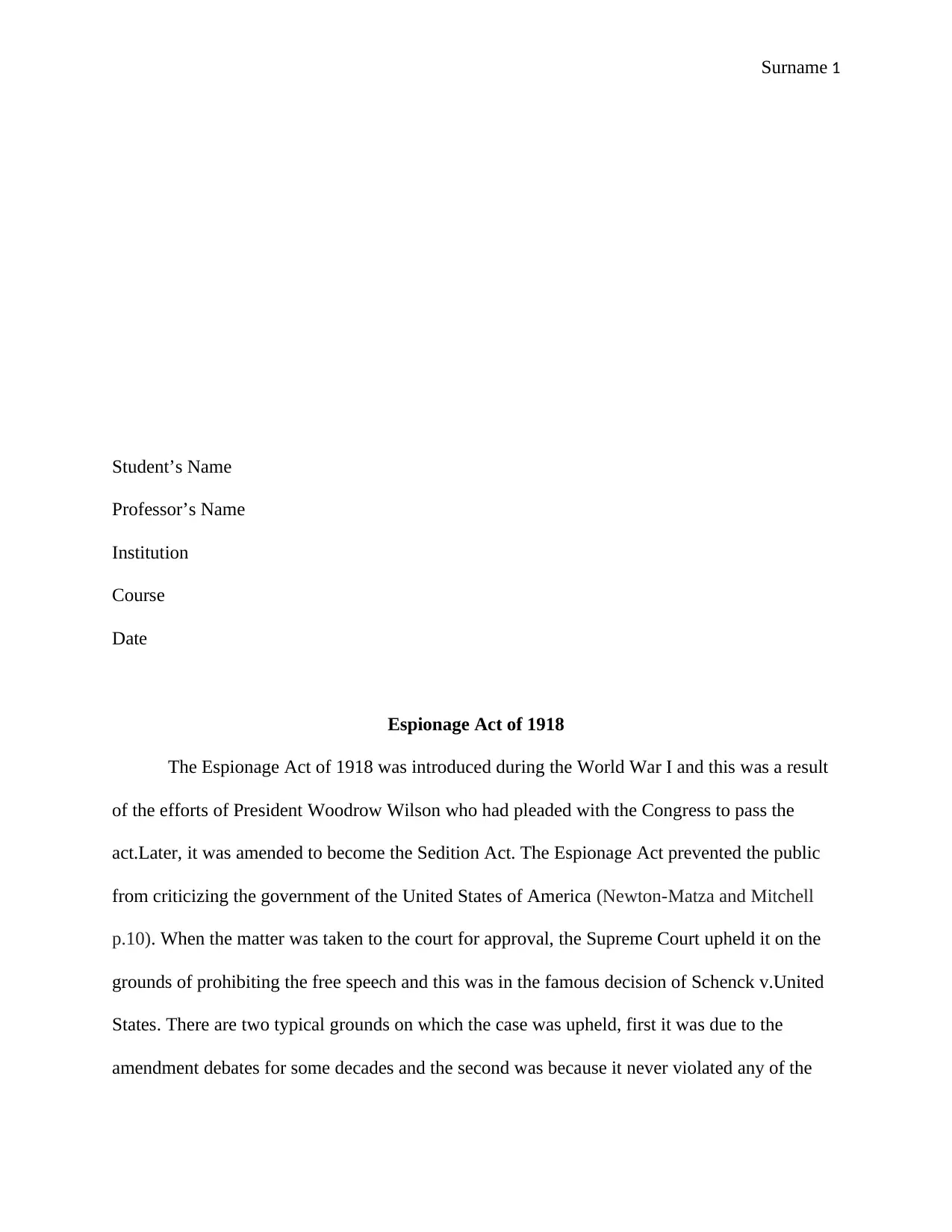
Surname 1
Student’s Name
Professor’s Name
Institution
Course
Date
Espionage Act of 1918
The Espionage Act of 1918 was introduced during the World War I and this was a result
of the efforts of President Woodrow Wilson who had pleaded with the Congress to pass the
act.Later, it was amended to become the Sedition Act. The Espionage Act prevented the public
from criticizing the government of the United States of America (Newton-Matza and Mitchell
p.10). When the matter was taken to the court for approval, the Supreme Court upheld it on the
grounds of prohibiting the free speech and this was in the famous decision of Schenck v.United
States. There are two typical grounds on which the case was upheld, first it was due to the
amendment debates for some decades and the second was because it never violated any of the
Student’s Name
Professor’s Name
Institution
Course
Date
Espionage Act of 1918
The Espionage Act of 1918 was introduced during the World War I and this was a result
of the efforts of President Woodrow Wilson who had pleaded with the Congress to pass the
act.Later, it was amended to become the Sedition Act. The Espionage Act prevented the public
from criticizing the government of the United States of America (Newton-Matza and Mitchell
p.10). When the matter was taken to the court for approval, the Supreme Court upheld it on the
grounds of prohibiting the free speech and this was in the famous decision of Schenck v.United
States. There are two typical grounds on which the case was upheld, first it was due to the
amendment debates for some decades and the second was because it never violated any of the
Paraphrase This Document
Need a fresh take? Get an instant paraphrase of this document with our AI Paraphraser
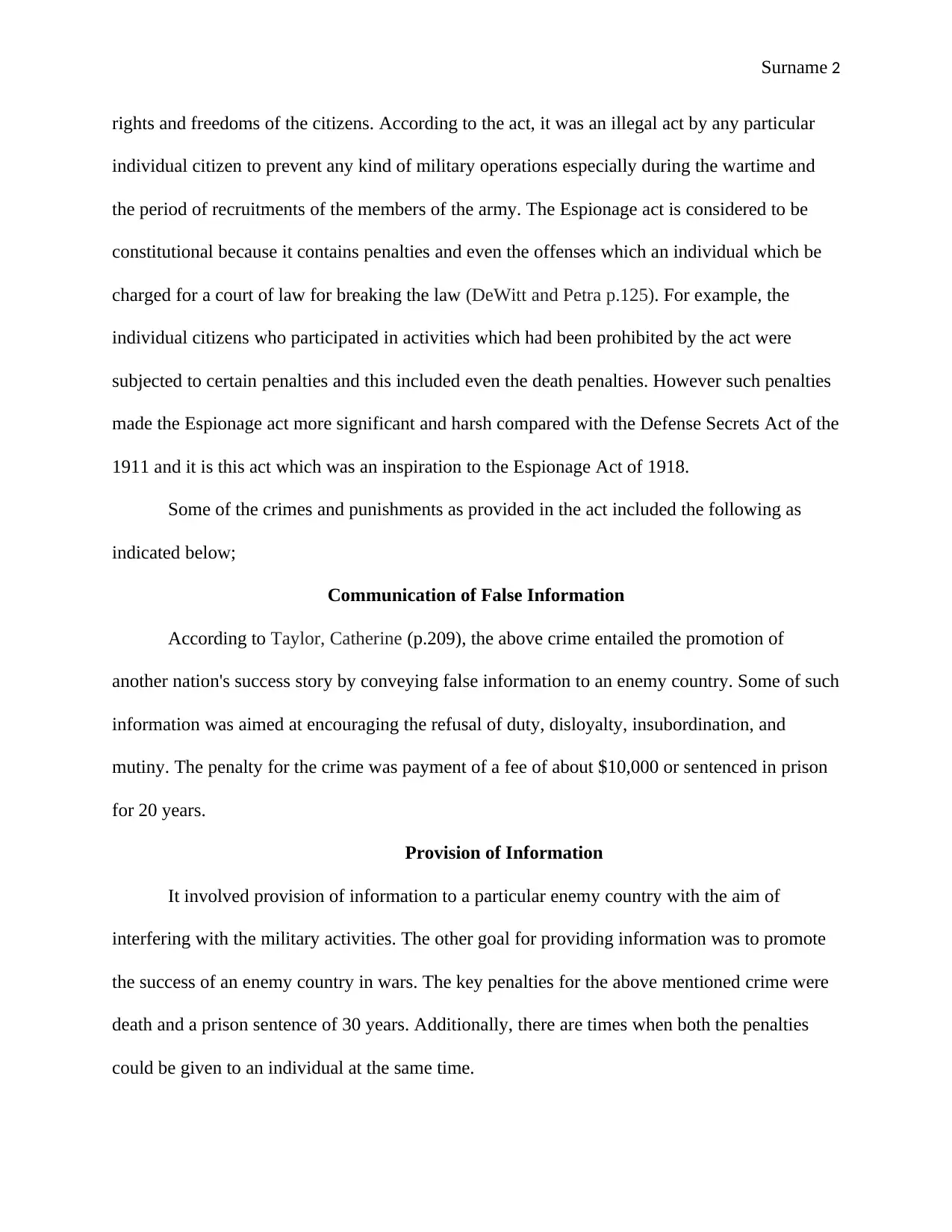
Surname 2
rights and freedoms of the citizens. According to the act, it was an illegal act by any particular
individual citizen to prevent any kind of military operations especially during the wartime and
the period of recruitments of the members of the army. The Espionage act is considered to be
constitutional because it contains penalties and even the offenses which an individual which be
charged for a court of law for breaking the law (DeWitt and Petra p.125). For example, the
individual citizens who participated in activities which had been prohibited by the act were
subjected to certain penalties and this included even the death penalties. However such penalties
made the Espionage act more significant and harsh compared with the Defense Secrets Act of the
1911 and it is this act which was an inspiration to the Espionage Act of 1918.
Some of the crimes and punishments as provided in the act included the following as
indicated below;
Communication of False Information
According to Taylor, Catherine (p.209), the above crime entailed the promotion of
another nation's success story by conveying false information to an enemy country. Some of such
information was aimed at encouraging the refusal of duty, disloyalty, insubordination, and
mutiny. The penalty for the crime was payment of a fee of about $10,000 or sentenced in prison
for 20 years.
Provision of Information
It involved provision of information to a particular enemy country with the aim of
interfering with the military activities. The other goal for providing information was to promote
the success of an enemy country in wars. The key penalties for the above mentioned crime were
death and a prison sentence of 30 years. Additionally, there are times when both the penalties
could be given to an individual at the same time.
rights and freedoms of the citizens. According to the act, it was an illegal act by any particular
individual citizen to prevent any kind of military operations especially during the wartime and
the period of recruitments of the members of the army. The Espionage act is considered to be
constitutional because it contains penalties and even the offenses which an individual which be
charged for a court of law for breaking the law (DeWitt and Petra p.125). For example, the
individual citizens who participated in activities which had been prohibited by the act were
subjected to certain penalties and this included even the death penalties. However such penalties
made the Espionage act more significant and harsh compared with the Defense Secrets Act of the
1911 and it is this act which was an inspiration to the Espionage Act of 1918.
Some of the crimes and punishments as provided in the act included the following as
indicated below;
Communication of False Information
According to Taylor, Catherine (p.209), the above crime entailed the promotion of
another nation's success story by conveying false information to an enemy country. Some of such
information was aimed at encouraging the refusal of duty, disloyalty, insubordination, and
mutiny. The penalty for the crime was payment of a fee of about $10,000 or sentenced in prison
for 20 years.
Provision of Information
It involved provision of information to a particular enemy country with the aim of
interfering with the military activities. The other goal for providing information was to promote
the success of an enemy country in wars. The key penalties for the above mentioned crime were
death and a prison sentence of 30 years. Additionally, there are times when both the penalties
could be given to an individual at the same time.
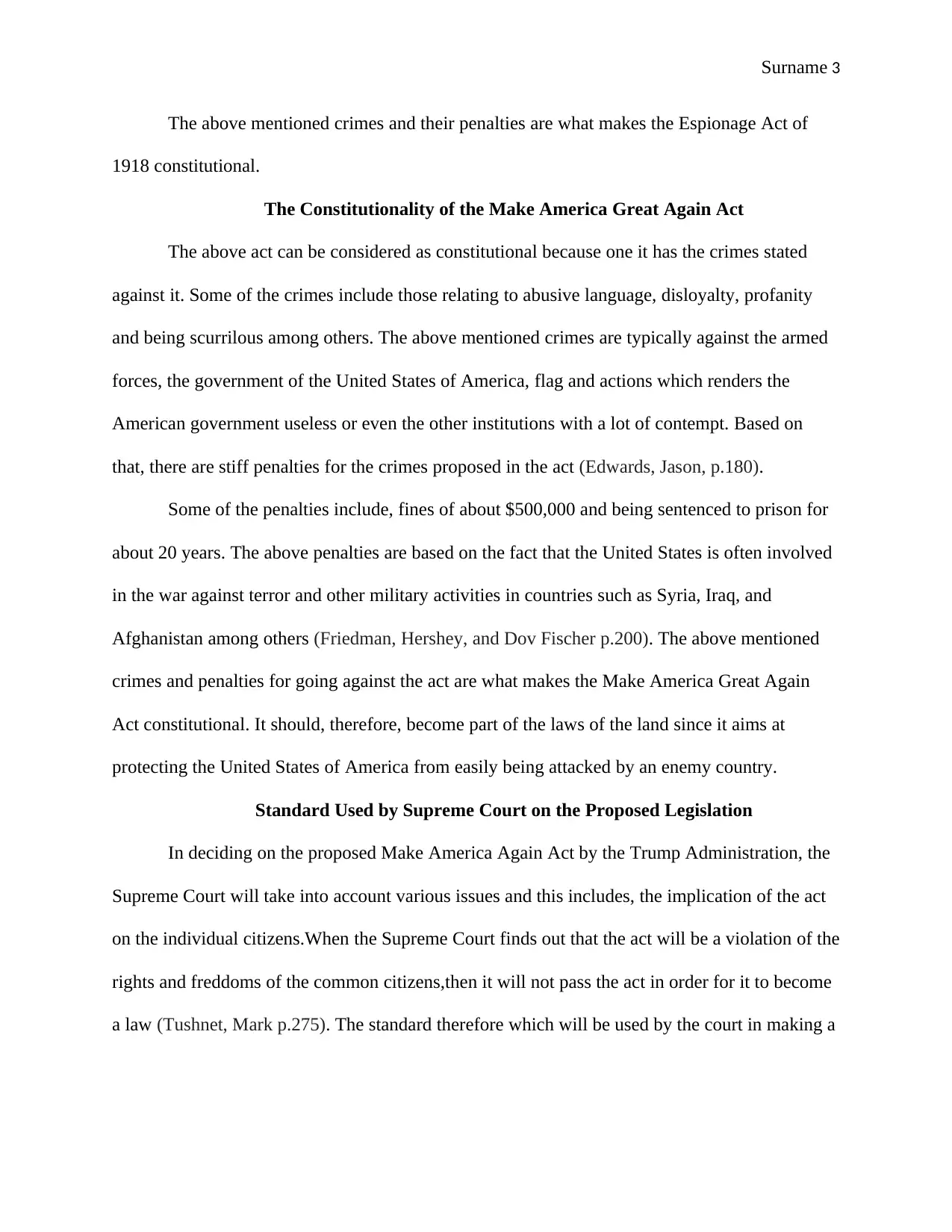
Surname 3
The above mentioned crimes and their penalties are what makes the Espionage Act of
1918 constitutional.
The Constitutionality of the Make America Great Again Act
The above act can be considered as constitutional because one it has the crimes stated
against it. Some of the crimes include those relating to abusive language, disloyalty, profanity
and being scurrilous among others. The above mentioned crimes are typically against the armed
forces, the government of the United States of America, flag and actions which renders the
American government useless or even the other institutions with a lot of contempt. Based on
that, there are stiff penalties for the crimes proposed in the act (Edwards, Jason, p.180).
Some of the penalties include, fines of about $500,000 and being sentenced to prison for
about 20 years. The above penalties are based on the fact that the United States is often involved
in the war against terror and other military activities in countries such as Syria, Iraq, and
Afghanistan among others (Friedman, Hershey, and Dov Fischer p.200). The above mentioned
crimes and penalties for going against the act are what makes the Make America Great Again
Act constitutional. It should, therefore, become part of the laws of the land since it aims at
protecting the United States of America from easily being attacked by an enemy country.
Standard Used by Supreme Court on the Proposed Legislation
In deciding on the proposed Make America Again Act by the Trump Administration, the
Supreme Court will take into account various issues and this includes, the implication of the act
on the individual citizens.When the Supreme Court finds out that the act will be a violation of the
rights and freddoms of the common citizens,then it will not pass the act in order for it to become
a law (Tushnet, Mark p.275). The standard therefore which will be used by the court in making a
The above mentioned crimes and their penalties are what makes the Espionage Act of
1918 constitutional.
The Constitutionality of the Make America Great Again Act
The above act can be considered as constitutional because one it has the crimes stated
against it. Some of the crimes include those relating to abusive language, disloyalty, profanity
and being scurrilous among others. The above mentioned crimes are typically against the armed
forces, the government of the United States of America, flag and actions which renders the
American government useless or even the other institutions with a lot of contempt. Based on
that, there are stiff penalties for the crimes proposed in the act (Edwards, Jason, p.180).
Some of the penalties include, fines of about $500,000 and being sentenced to prison for
about 20 years. The above penalties are based on the fact that the United States is often involved
in the war against terror and other military activities in countries such as Syria, Iraq, and
Afghanistan among others (Friedman, Hershey, and Dov Fischer p.200). The above mentioned
crimes and penalties for going against the act are what makes the Make America Great Again
Act constitutional. It should, therefore, become part of the laws of the land since it aims at
protecting the United States of America from easily being attacked by an enemy country.
Standard Used by Supreme Court on the Proposed Legislation
In deciding on the proposed Make America Again Act by the Trump Administration, the
Supreme Court will take into account various issues and this includes, the implication of the act
on the individual citizens.When the Supreme Court finds out that the act will be a violation of the
rights and freddoms of the common citizens,then it will not pass the act in order for it to become
a law (Tushnet, Mark p.275). The standard therefore which will be used by the court in making a
⊘ This is a preview!⊘
Do you want full access?
Subscribe today to unlock all pages.

Trusted by 1+ million students worldwide
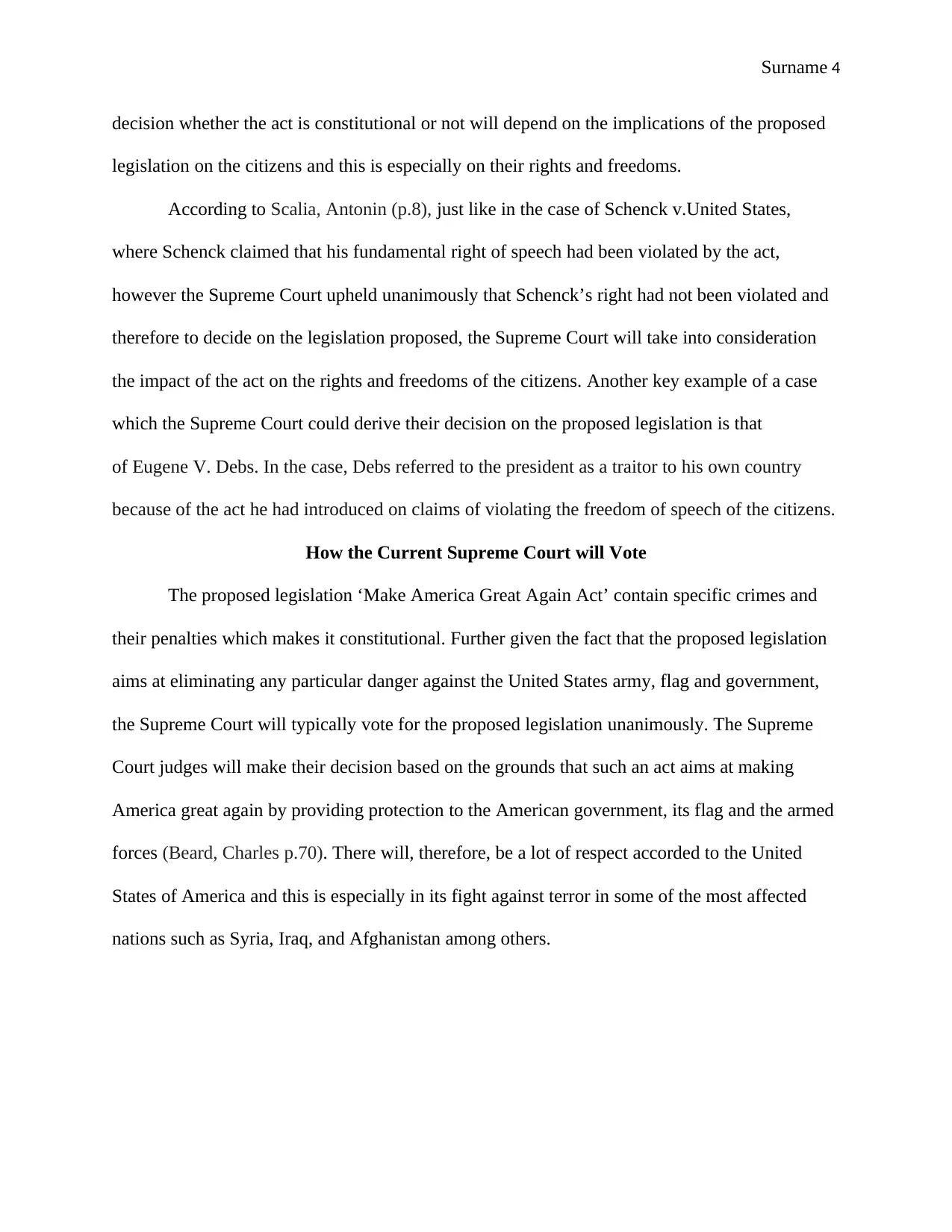
Surname 4
decision whether the act is constitutional or not will depend on the implications of the proposed
legislation on the citizens and this is especially on their rights and freedoms.
According to Scalia, Antonin (p.8), just like in the case of Schenck v.United States,
where Schenck claimed that his fundamental right of speech had been violated by the act,
however the Supreme Court upheld unanimously that Schenck’s right had not been violated and
therefore to decide on the legislation proposed, the Supreme Court will take into consideration
the impact of the act on the rights and freedoms of the citizens. Another key example of a case
which the Supreme Court could derive their decision on the proposed legislation is that
of Eugene V. Debs. In the case, Debs referred to the president as a traitor to his own country
because of the act he had introduced on claims of violating the freedom of speech of the citizens.
How the Current Supreme Court will Vote
The proposed legislation ‘Make America Great Again Act’ contain specific crimes and
their penalties which makes it constitutional. Further given the fact that the proposed legislation
aims at eliminating any particular danger against the United States army, flag and government,
the Supreme Court will typically vote for the proposed legislation unanimously. The Supreme
Court judges will make their decision based on the grounds that such an act aims at making
America great again by providing protection to the American government, its flag and the armed
forces (Beard, Charles p.70). There will, therefore, be a lot of respect accorded to the United
States of America and this is especially in its fight against terror in some of the most affected
nations such as Syria, Iraq, and Afghanistan among others.
decision whether the act is constitutional or not will depend on the implications of the proposed
legislation on the citizens and this is especially on their rights and freedoms.
According to Scalia, Antonin (p.8), just like in the case of Schenck v.United States,
where Schenck claimed that his fundamental right of speech had been violated by the act,
however the Supreme Court upheld unanimously that Schenck’s right had not been violated and
therefore to decide on the legislation proposed, the Supreme Court will take into consideration
the impact of the act on the rights and freedoms of the citizens. Another key example of a case
which the Supreme Court could derive their decision on the proposed legislation is that
of Eugene V. Debs. In the case, Debs referred to the president as a traitor to his own country
because of the act he had introduced on claims of violating the freedom of speech of the citizens.
How the Current Supreme Court will Vote
The proposed legislation ‘Make America Great Again Act’ contain specific crimes and
their penalties which makes it constitutional. Further given the fact that the proposed legislation
aims at eliminating any particular danger against the United States army, flag and government,
the Supreme Court will typically vote for the proposed legislation unanimously. The Supreme
Court judges will make their decision based on the grounds that such an act aims at making
America great again by providing protection to the American government, its flag and the armed
forces (Beard, Charles p.70). There will, therefore, be a lot of respect accorded to the United
States of America and this is especially in its fight against terror in some of the most affected
nations such as Syria, Iraq, and Afghanistan among others.
Paraphrase This Document
Need a fresh take? Get an instant paraphrase of this document with our AI Paraphraser
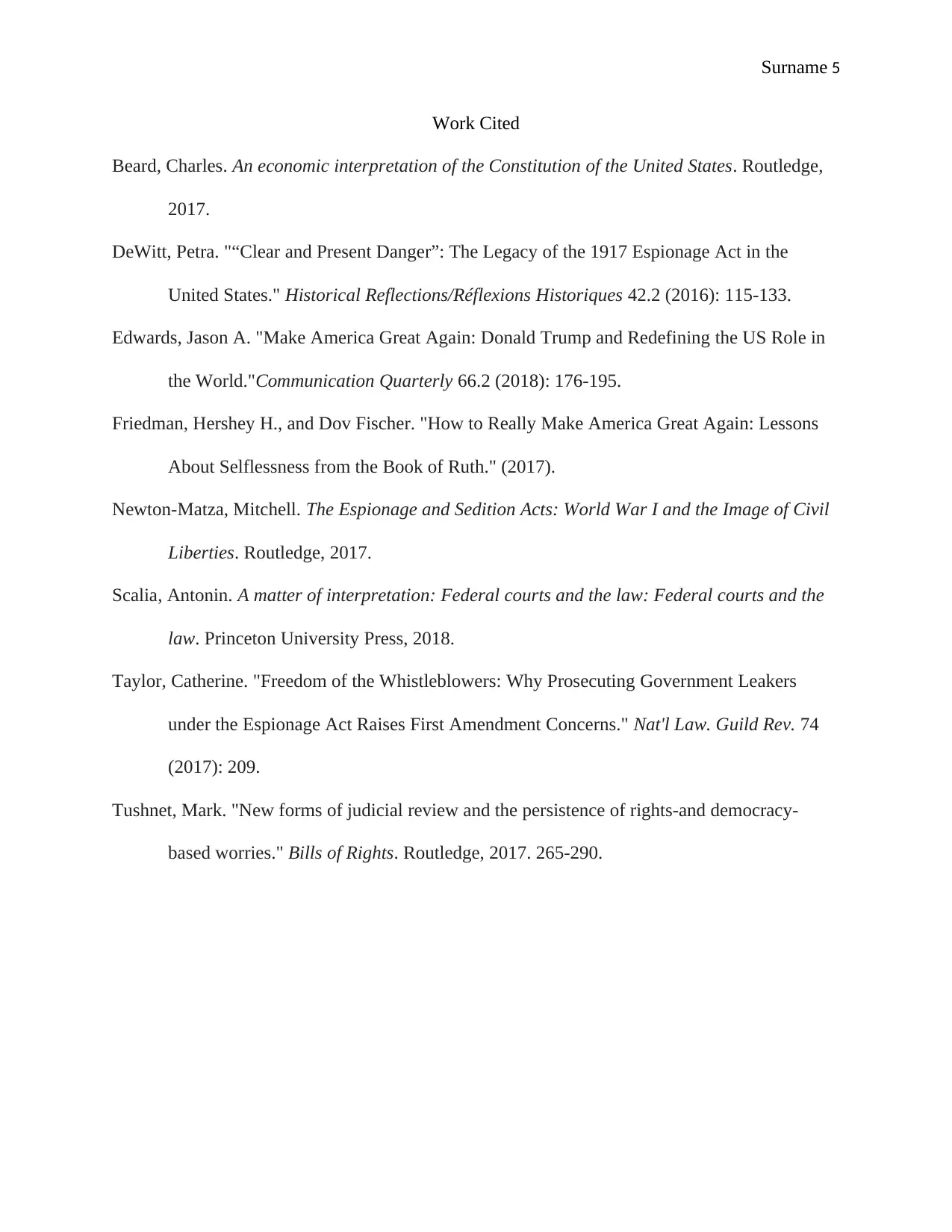
Surname 5
Work Cited
Beard, Charles. An economic interpretation of the Constitution of the United States. Routledge,
2017.
DeWitt, Petra. "“Clear and Present Danger”: The Legacy of the 1917 Espionage Act in the
United States." Historical Reflections/Réflexions Historiques 42.2 (2016): 115-133.
Edwards, Jason A. "Make America Great Again: Donald Trump and Redefining the US Role in
the World."Communication Quarterly 66.2 (2018): 176-195.
Friedman, Hershey H., and Dov Fischer. "How to Really Make America Great Again: Lessons
About Selflessness from the Book of Ruth." (2017).
Newton-Matza, Mitchell. The Espionage and Sedition Acts: World War I and the Image of Civil
Liberties. Routledge, 2017.
Scalia, Antonin. A matter of interpretation: Federal courts and the law: Federal courts and the
law. Princeton University Press, 2018.
Taylor, Catherine. "Freedom of the Whistleblowers: Why Prosecuting Government Leakers
under the Espionage Act Raises First Amendment Concerns." Nat'l Law. Guild Rev. 74
(2017): 209.
Tushnet, Mark. "New forms of judicial review and the persistence of rights-and democracy-
based worries." Bills of Rights. Routledge, 2017. 265-290.
Work Cited
Beard, Charles. An economic interpretation of the Constitution of the United States. Routledge,
2017.
DeWitt, Petra. "“Clear and Present Danger”: The Legacy of the 1917 Espionage Act in the
United States." Historical Reflections/Réflexions Historiques 42.2 (2016): 115-133.
Edwards, Jason A. "Make America Great Again: Donald Trump and Redefining the US Role in
the World."Communication Quarterly 66.2 (2018): 176-195.
Friedman, Hershey H., and Dov Fischer. "How to Really Make America Great Again: Lessons
About Selflessness from the Book of Ruth." (2017).
Newton-Matza, Mitchell. The Espionage and Sedition Acts: World War I and the Image of Civil
Liberties. Routledge, 2017.
Scalia, Antonin. A matter of interpretation: Federal courts and the law: Federal courts and the
law. Princeton University Press, 2018.
Taylor, Catherine. "Freedom of the Whistleblowers: Why Prosecuting Government Leakers
under the Espionage Act Raises First Amendment Concerns." Nat'l Law. Guild Rev. 74
(2017): 209.
Tushnet, Mark. "New forms of judicial review and the persistence of rights-and democracy-
based worries." Bills of Rights. Routledge, 2017. 265-290.
1 out of 5
Your All-in-One AI-Powered Toolkit for Academic Success.
+13062052269
info@desklib.com
Available 24*7 on WhatsApp / Email
![[object Object]](/_next/static/media/star-bottom.7253800d.svg)
Unlock your academic potential
Copyright © 2020–2026 A2Z Services. All Rights Reserved. Developed and managed by ZUCOL.